Rate transparency information is posted in accordance with An Act To Provide Transparency in Electricity Pricing for Maine Ratepayers and the Commission’s Report on Transparency in Electricity Rates and Assessments. The purpose of the Act is to create increased transparency regarding the costs and effects of State energy policies on electricity rates. To put these costs in perspective and provide greater electric rate transparency, this reporting also itemizes costs associated with transmission, distribution, and supply.
A description of the benefits associated with each State energy policy is available below the charts.
Please note:
- The rates presented represent average rates over all rate classes.
- Not all components apply to all rate classes.
- Supply costs are inclusive of certain State energy policies, such as the Renewable Portfolio Standard and the Regional Greenhouse Gas Initiative.
- Regional Greenhouse Gas Initiative costs reflect only the small class loads served by standard offer service.
Central Maine Power Company's Average Rates by Component
2024 Calendar Year
| Cost Component | Total Cost | Cents per kWh | Percent of Total |
|---|---|---|---|
| Supply | $503,830,280 | 10.88 | 35% |
| Distribution | $414,950,063 | 4.76 | 29% |
| Transmission | $236,674,987 | 2.71 | 17% |
| Renewable Resource Portfolio | $67,912,642 | 0.70 | 5% |
| Efficiency Maine Trust | $34,450,988 | 0.39 | 2% |
| Regional Greenhouse Gas Initiative | $26,300,927 | 0.71 | 2% |
| Utility Energy Supply Contract Obligations | $127,301,751 | 1.46 | 9% |
| Low Income Program | $11,353,158 | 0.13 | 1% |
| MPUC Assessment | $6,831,208 | 0.08 | 0.5% |
| OPA Assessment | $1,705,826 | 0.02 | 0.1% |
| Total | $1,431,311,829 | 21.83 | 100% |
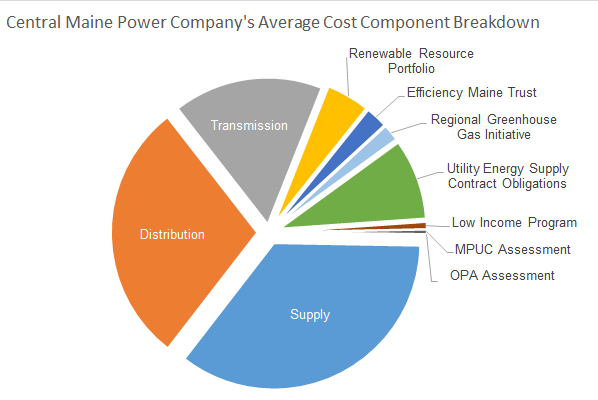
Versant Power- Bangor Hydro District's Average Rates by Component
2024 Calendar Year
| Cost Component | Total Cost | Cents per kWh | Percent of Total |
|---|---|---|---|
| Distribution | $190,950,120 | 13.22 | 46% |
| Supply | $99,826,765 | 10.74 | 24% |
| Transmission | $67,117,980 | 4.65 | 16% |
| Renewable Resource Portfolio | $11,245,256 | 0.70 | 3% |
| Efficiency Maine Trust | $6,130,249 | 0.42 | 1% |
| Utility Energy Supply Contract Obligations | $30,764,841 | 2.13 | 7% |
| Regional Greenhouse Gas Initiative | $7,443,108 | 1.02 | 2% |
| MPUC Assessment | $1,448,603 | 0.10 | 0.3% |
| Low Income Program | $2,354,849 | 0.16 | 0.6% |
| OPA Assessment | $361,731 | 0.03 | 0.1% |
| Total | $417,643,501 | 33.17 | 100% |
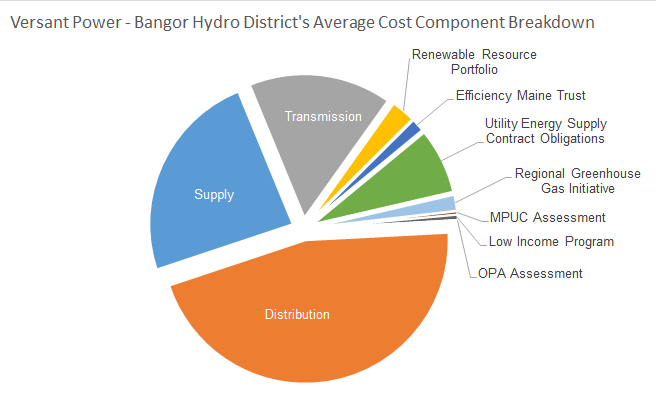
Versant Power - Maine Public District's Average Rates by Component
2024 Calendar Year
| Cost Component | Total Cost | Cents per kWh | Percent of Total |
|---|---|---|---|
| Supply | $38,262,571 | 11.60 | 29% |
| Distribution | $63,029,930 | 12.07 | 47% |
| Transmission | $15,129,216 | 2.90 | 11% |
| Renewable Resource Portfolio | $4,064,993 | 0.70 | 3% |
| Efficiency Maine Trust | $1,705,560 | 0.33 | 1% |
| Utility Energy Supply Contract Obligations | $9,670,002 | 1.85 | 7% |
| Regional Greenhouse Gas Initiative | $367,839 | 0.13 | 0.3% |
| MPUC Assessment | $523,648 | 0.10 | 0.4% |
| Low Income Program | $851,243 | 0.16 | 0.6% |
| OPA Assessment | $130,761 | 0.03 | 0.1% |
| Total | $133,735,762 | 29.87 | 100% |
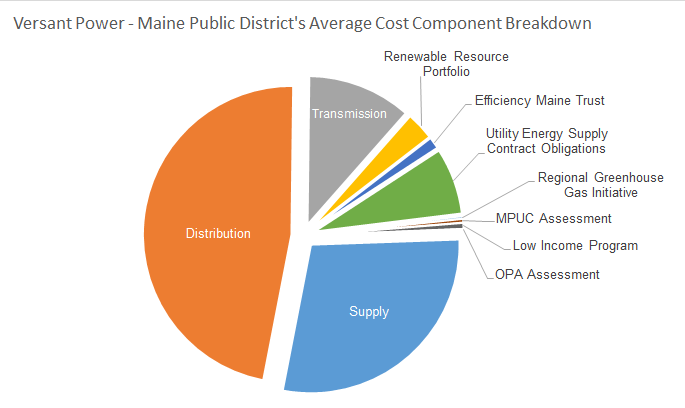
- 2023 Calendar Year
-
Central Maine Power Company's Average Rates by Component
2023 Calendar Year
Cost Component Total Cost Cents per kWh Percent of Total Supply $828,683,163 16.81 52% Distribution $342,293,295 3.95 21% Transmission $309,691,724 3.58 19% Renewable Resource Portfolio $36,131,746 0.42 2% Efficiency Maine Trust $31,246,376 0.36 2% Regional Greenhouse Gas Initiative $22,202,971 0.54 1% Utility Energy Supply Contract Obligations $13,813,180 0.16 1% Low Income Program $11,148,191 0.13 1% MPUC Assessment $5,674,974 0.07 0.4% OPA Assessment $1,566,704 0.02 0.1% Total $1,602,452,323 26.03 100% 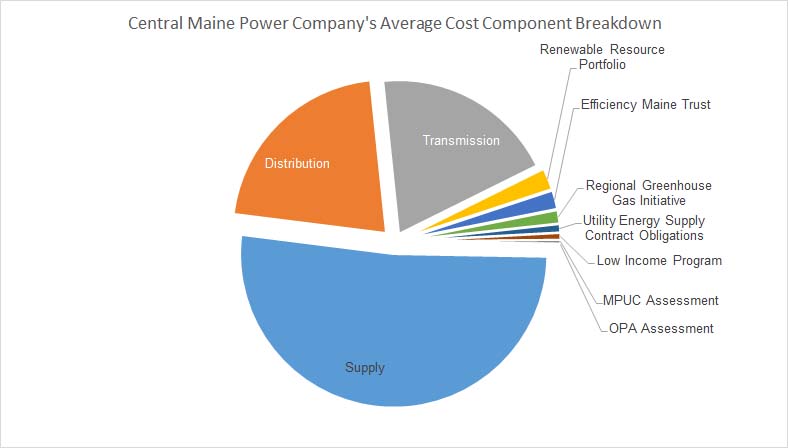
Versant Power- Bangor Hydro District's Average Rates by Component
2023 Calendar Year
Cost Component Total Cost Cents per kWh Percent of Total Distribution $165,010,416 11.09 42% Supply $146,079,423 15.60 37% Transmission $61,795,643 4.15 16% Renewable Resource Portfolio $6,207,850 0.42 2% Efficiency Maine Trust $5,308,257 0.36 1% Utility Energy Supply Contract Obligations $4,795,344 0.32 1% Regional Greenhouse Gas Initiative $3,723,539 0.48 1% MPUC Assessment $1,254,071 0.08 0.3% Low Income Program $539,585 0.04 0.1% OPA Assessment $346,214 0.02 0.1% Total $395,060,342 32.57 100% 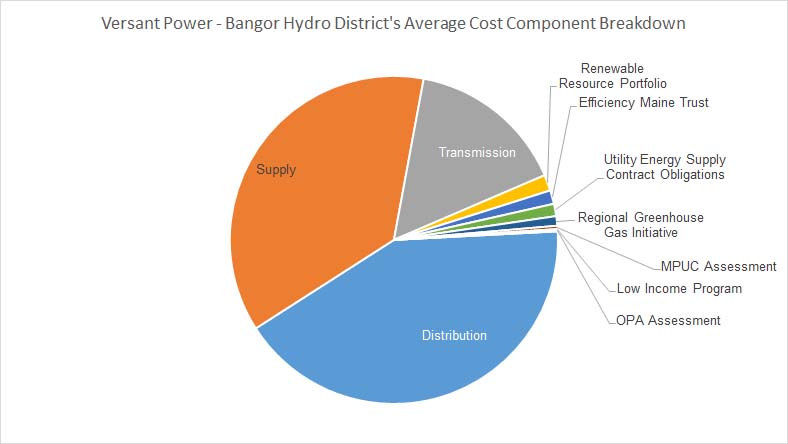
Versant Power - Maine Public District's Average Rates by Component
2023 Calendar Year
Cost Component Total Cost Cents per kWh Percent of Total Supply $59,225,775 14.90 44% Distribution $54,025,070 10.35 40% Transmission $14,196,602 2.72 11% Renewable Resource Portfolio $2,178,664 0.42 2% Efficiency Maine Trust $1,543,260 0.30 1% Utility Energy Supply Contract Obligations $1,198,424 0.23 1% Regional Greenhouse Gas Initiative $469,201 0.14 0.4% MPUC Assessment $440,120 0.08 0.3% Low Income Program $189,369 0.04 0.1% OPA Assessment $121,505 0.02 0.1% Total $133,587,990 29.19 100% 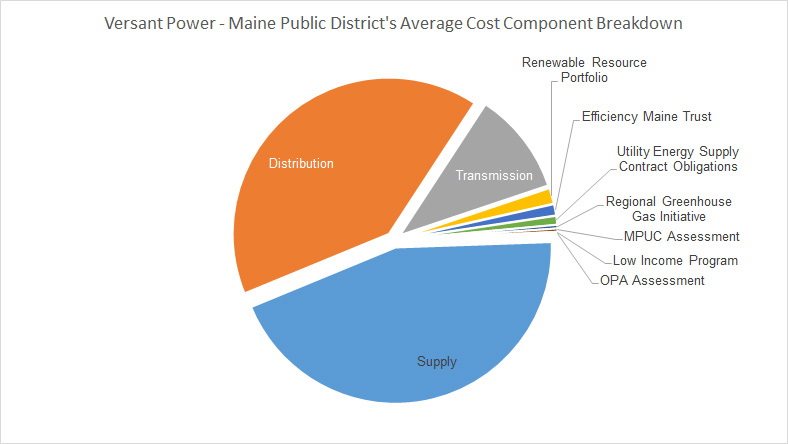
- 2022 Calendar Year
-
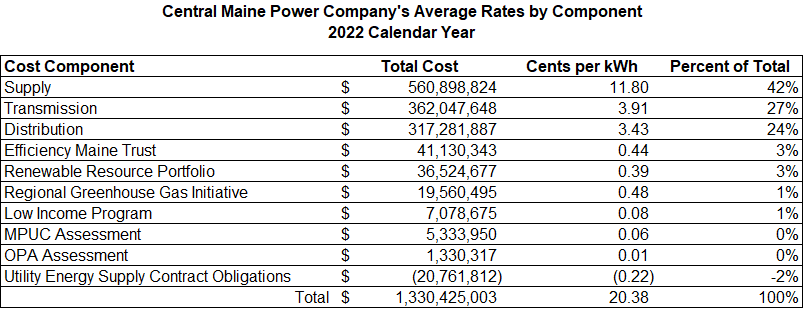
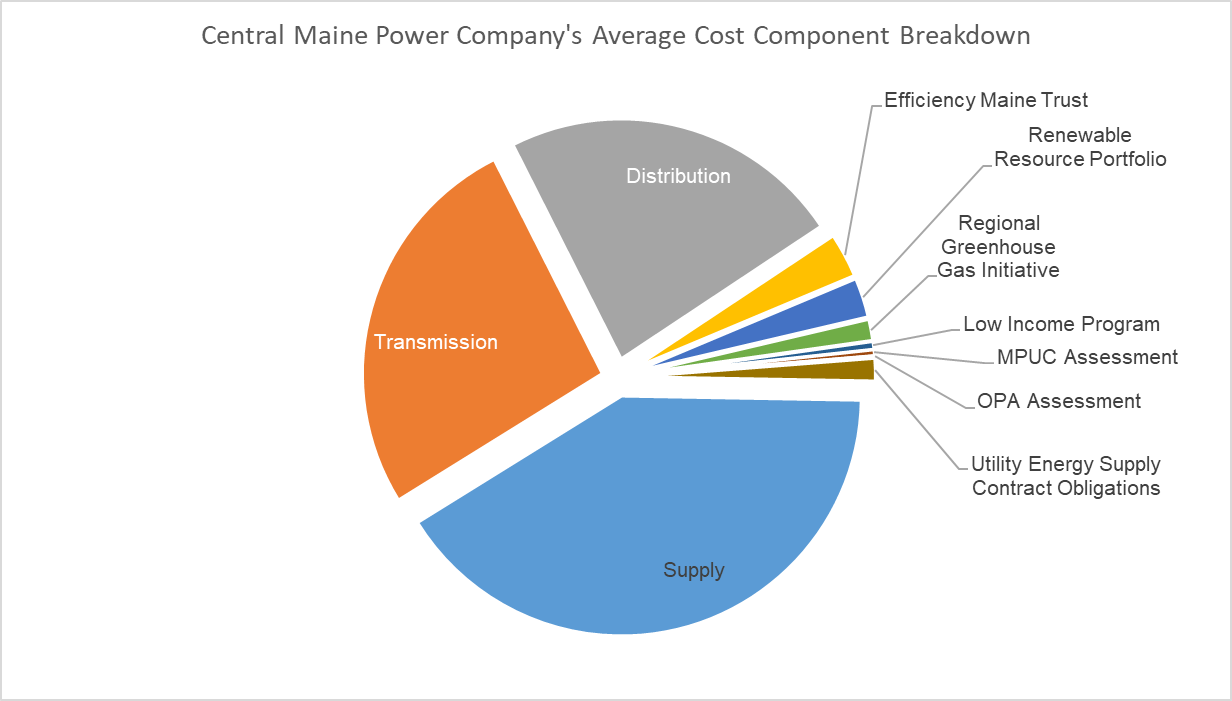
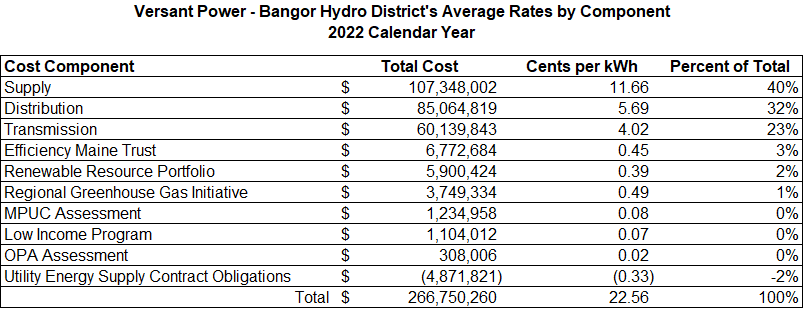
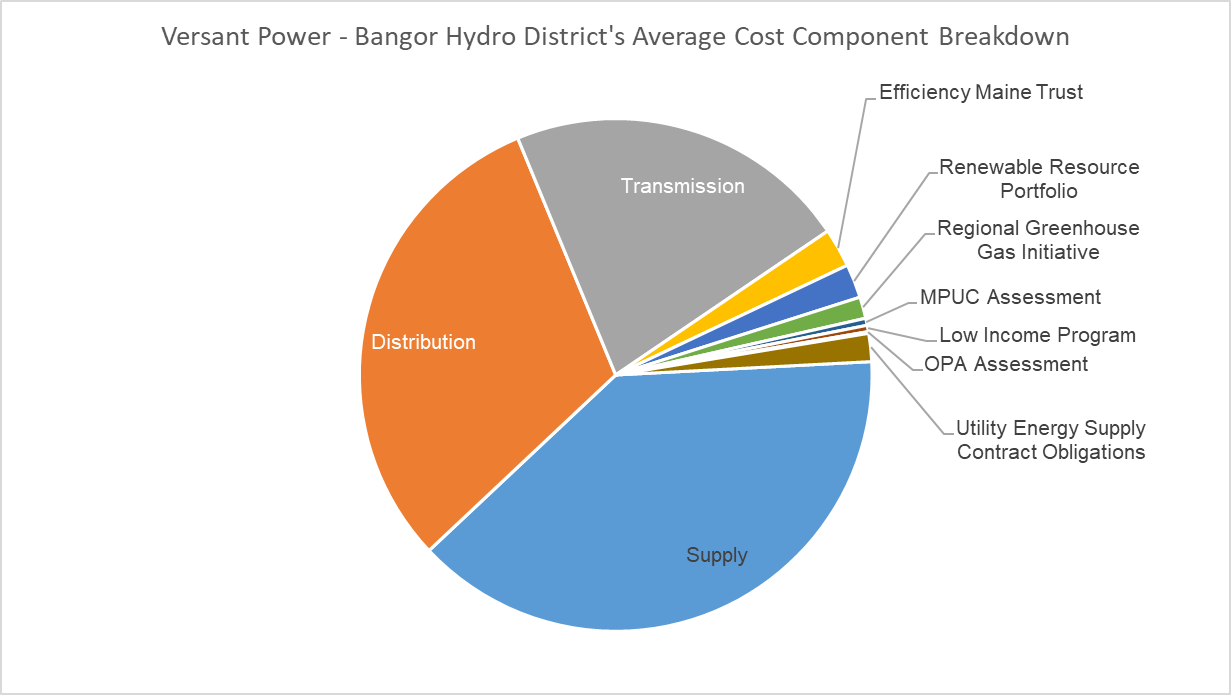
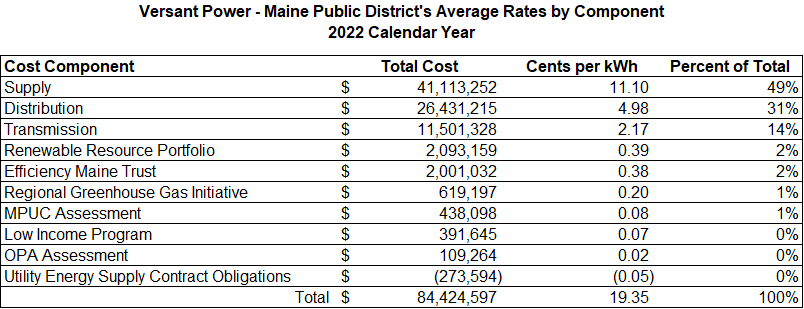
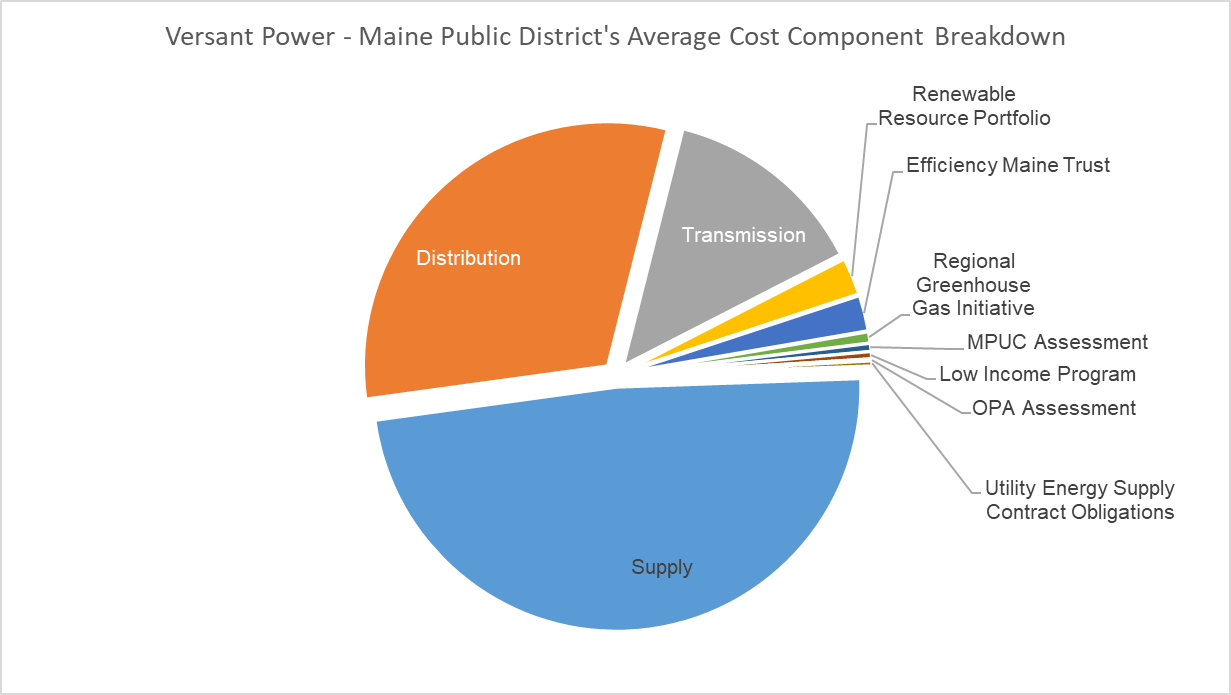
Maine Public Utilities Commission Assessment: Provides funds for the operations of the Maine Public Utilities Commission, in addition to funds provided through assessments in other utility rates, including telephone, natural gas, and water utility rates. The Maine Public Utilities Commission regulates the rates and services of public utilities and oversees the competitive retail electricity market.
Office of the Public Advocate Assessment: Provides funds for the operations of the Office of the Public Advocate, in addition to funds provided through assessments in other utility rates, including telephone, natural gas, and water utility rates. The Office of the Public Advocate advocates on behalf of residential and small commercial ratepayers in Maine Public Utilities Commission, regional and federal proceedings.
Efficiency Maine Trust charge: The Efficiency Maine Trust (EMT) administers energy efficiency and conservation programs throughout the State for the purpose of lowering the costs of electricity for Maine’s residents and business. A portion of the Efficiency Maine Trust’s budget is funded by a charge included in electricity rates. The EMT website has information on available programs.
Low-income program costs: Maine statute provides for electricity bill discounts for low-income customers. The program is funded by a charge included in electricity rates.
Renewable resource portfolio requirement costs: The renewable resource portfolio requirements in Maine and other New England states are designed to encourage renewable resource development and resource diversity in New England with the objective of promoting regional electricity cost stability and lower regional electricity costs as well as achieving environmental benefits. A 2011 MPUC report contains a discussion of the benefits and costs of the portfolio requirement: MPUC RPS Report 2011 - Review of RPS Requirements and Compliance in Maine.
Regional Greenhouse Gas Initiative (RGGI) compliance costs: RGGI is a nine-state program to reduce greenhouse gas emissions from electricity generating power plants that serve New England, New York, Maryland, and Delaware. The costs of the program are paid directly by power plants that generate greenhouse gas emissions with Maine’s proceeds used for energy efficiency programs (RGGI website).
Utility energy supply contract obligations: Electricity supply contracts are intended to facilitate the development of electric power generating plants and/or provide electric rate stability benefits. These contracts are also designed to provide benefits in the form of lower wholesale regional wholesale electricity costs and to encourage renewable energy development. This category includes both legacy stranded costs and post-restructuring long-term contracts costs/benefits.